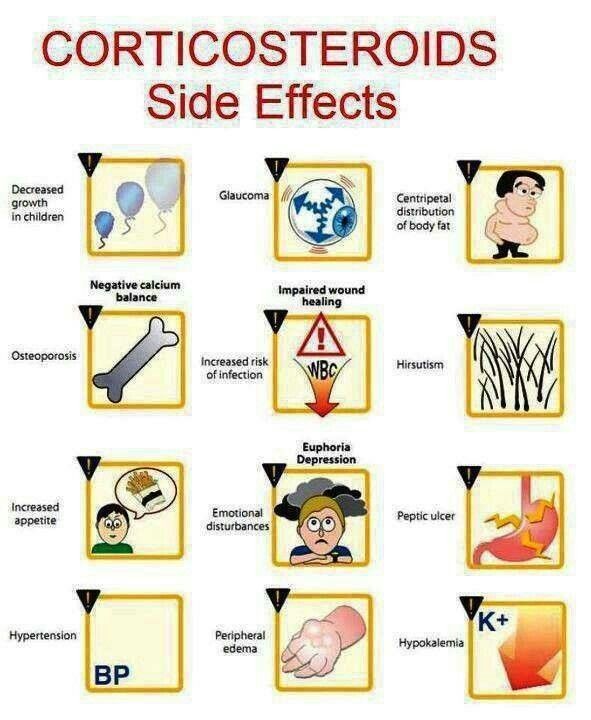
Contents
Corticosteroids vs. NSAIDs
Corticosteroids are glucocorticoids that suppress inflammation and immunity and assist in breaking down fats, carbohydrates, and proteins. They are also mineralocorticoids that regulate salt and water balance. Corticosteroids are used to treat arthritis, colitis, asthma, bronchitis, allergic reactions, and skin rashes.
NSAIDs are nonsteroidal anti-inflammatory drugs used to treat pain and reduce inflammation from various causes including headaches, injuries, arthritis, menstrual cramps, and muscle aches. They also reduce fever. NSAIDs work by blocking cyclooxygenase (COX) enzymes, which reduces inflammation, pain, and fever but may cause gastrointestinal side effects.
Side effects of corticosteroids and NSAIDs
Corticosteroid side effects
Corticosteroids have many side effects, which can be mild or serious. These side effects are more apparent with higher doses or prolonged use. Some side effects include:
- Sodium and fluid retention causing weight gain or leg swelling (edema)
- High blood pressure
- Potassium loss
- Headache
- Muscle weakness
- Puffiness of the face (moon face)
- Facial hair growth
- Thin and easily bruised skin
- Slow wound healing
- Glaucoma
- Cataracts
- Stomach and duodenal ulcers
- Loss of diabetes control
- Menstrual irregularity
- "Buffalo hump" (rounding of the upper back)
Prolonged use of corticosteroids may cause obesity, growth retardation in children, convulsions, psychiatric disturbances, osteoporosis, adrenal gland atrophy, and adrenal necrosis of the hip joints.
NSAID side effects
NSAIDs are associated with several side effects. Common side effects include:
- Kidney and liver failure
- Ulcers
- Prolonged bleeding after injury or surgery
NSAIDs can also cause fluid retention and allergic reactions. They increase the risk of stomach and intestinal adverse reactions and may increase the risk of heart attacks, stroke, and related conditions. NSAIDs should not be used for pain after coronary artery bypass surgery.
Drug interactions with corticosteroids and NSAIDs
Corticosteroid drug interactions
- Some drugs can increase corticosteroid levels and side effects. Others may reduce corticosteroid levels, necessitating an increased dose.
- Estrogens can increase the effects of corticosteroids.
- Warfarin may have variable effects when taken with corticosteroids, requiring closer monitoring.
- Combining corticosteroids with certain drugs can cause low blood potassium, heart failure, severe weakness in patients with myasthenia gravis, increased blood glucose, and other interactions.
NSAID drug interactions
- NSAIDs reduce kidney function and increase the action and blood levels of some drugs like lithium and methotrexate. They also increase bleeding and can interact with antihypertensive drugs and cyclosporine.
- NSAIDs increase bleeding when used with anticoagulant drugs like warfarin.
- NSAIDs can raise blood pressure and may interact with certain drugs used for hypertension.
- NSAIDs can interact with alcohol and increase the risk of stomach ulcers.
Types of corticosteroids and NSAIDs
Corticosteroids
The following systemic corticosteroids are available in the US:
Glucocorticoids:
- Hydrocortisone
- Cortisone
- Ethamethasone
- Prednisone
- Prednisolone
- Triamcinolone
- Methylprednisolone
- Dexamethasone
Mineralocorticoid:
NSAIDs
The following NSAIDs are available:
- Aspirin
- Celecoxib
- Diclofenac
- Diflunisal
- Etodolac
- Ibuprofen
- Indomethacin
- Ketoprofen
- Ketorolac
- Nabumetone
- Naproxen
- Oxaprozin
- Piroxicam
- Salsalate
- Sulindac
- Tolmetin
By clicking Submit, I agree to the MedicineNet’s Terms & Conditions & Privacy Policy and understand that I may opt out of MedicineNet’s subscriptions at any time.
Summary
Corticosteroids are synthetic hormones and NSAIDs are non-narcotic pain relievers. Both medications reduce inflammation and are used for pain relief.


